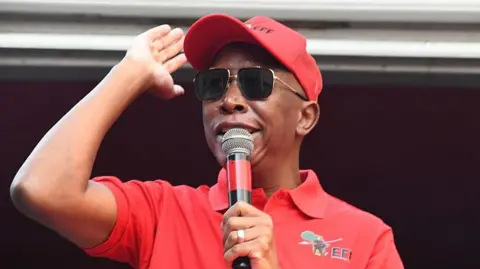South Africa's firebrand MP banned from entering UK
 Gallo Images via Getty Images
Gallo Images via Getty ImagesA controversial South African opposition MP, central to a row over race relations in the country, has been denied entry to the UK.
The Home Office said Julius Malema had been deemed "non-conducive to the public good" and that it was "undesirable" to grant him entry.
In a letter released by Malema's party, the Home Office cited his vocal support for Hamas, including a speech he made after the 7 October attacks in which he said his own party would arm the group if it came to power.
The UK said Malema had made "statements calling for the slaughter of white people [in South Africa] or hinted that it could be an acceptable option in the future", and also cited this as a reason for its decision.
His Economic Freedom Fighters (EFF) party, which came fourth in South Africa's parliamentary election last year, condemned the decision as "cowardice" and said it would stifle democratic debate.
The EFF said the UK had distorted Malema's views on how the "genuine frustrations of Africans who are excluded [from the economy] at the behest of a white minority may lead to social violence and resistance" in South Africa.
Malema and the party would not "trade" their "revolutionary beliefs in exchange for a visa", the EFF said.
"The UK and all of its allies can keep their visas, and we will keep our Africa and a commitment to support the oppressed of the world, especially the Palestinian people," the party added.
Malema featured prominently in a video played last month by President Donald Trump during a visit by South African President Cyril Ramaphosa to the White House.
In the video, Malema is seen singing "Shoot to kill" and "Kill the Boer", which Trump says incites violence against the ethnic Afrikaner group.
However, South Africa's Supreme Court of Appeal has ruled that the lyrics do not amount to hate speech and were a "provocative way" of advancing the EFF's political agenda - which was to end "land and economic injustice" .
The court added that a "reasonably well-informed person" would understand that when "protest songs are sung, even by politicians, the words are not meant to be understood literally, nor is the gesture of shooting to be understood as a call to arms or violence".
- Unpacking the South African land law that so inflames Trump
- Is there a genocide of white South Africans as Trump claims?
Malema is a fierce critic of what he sees as "Western imperialism", and advocates the nationalisation of white-owned land in South Africa to address the legacy of colonialism and the racist system of apartheid.
White-minority rule ended in South Africa in 1994, with the rise of Nelson Mandela and his African National Congress (ANC) to power.
This is the second time Malema has been denied entry to the UK in just two months.
The first time the UK government said he had submitted his application too late – this time, a British official in South Africa told the BBC it was a "substantive decision".
The Home Office said he has no right of appeal and was likely to be denied any future applications, according to the letter released by the EFF.
A Home Office spokesperson told the BBC: "It is our longstanding policy not to comment on individual cases."
Some of Malema's critics in South Africa are likely to welcome the UK's decision, and will hope that he will be more cautious in his public statements in the future.
But his supporters are likely to argue that he is being targeted for expressing views that the UK finds uncomfortable.
Official statistics show that South Africa's unemployment rate has risen to 33%, with black people being worst-affected.
The EFF's support-base, made up largely of young people, believes that more radical action is needed to tackle racial inequality and injustices.
The party got less than 10% of the vote in last year's election, and fell from third to fourth spot after losing support mostly to former President Jacob Zuma's uMkhonto weSizwe (Spear of the Nation) party.
More South Africa stories from the BBC:
 Getty Images/BBC
Getty Images/BBCGo to BBCAfrica.com for more news from the African continent.
Follow us on Twitter @BBCAfrica, on Facebook at BBC Africa or on Instagram at bbcafrica
